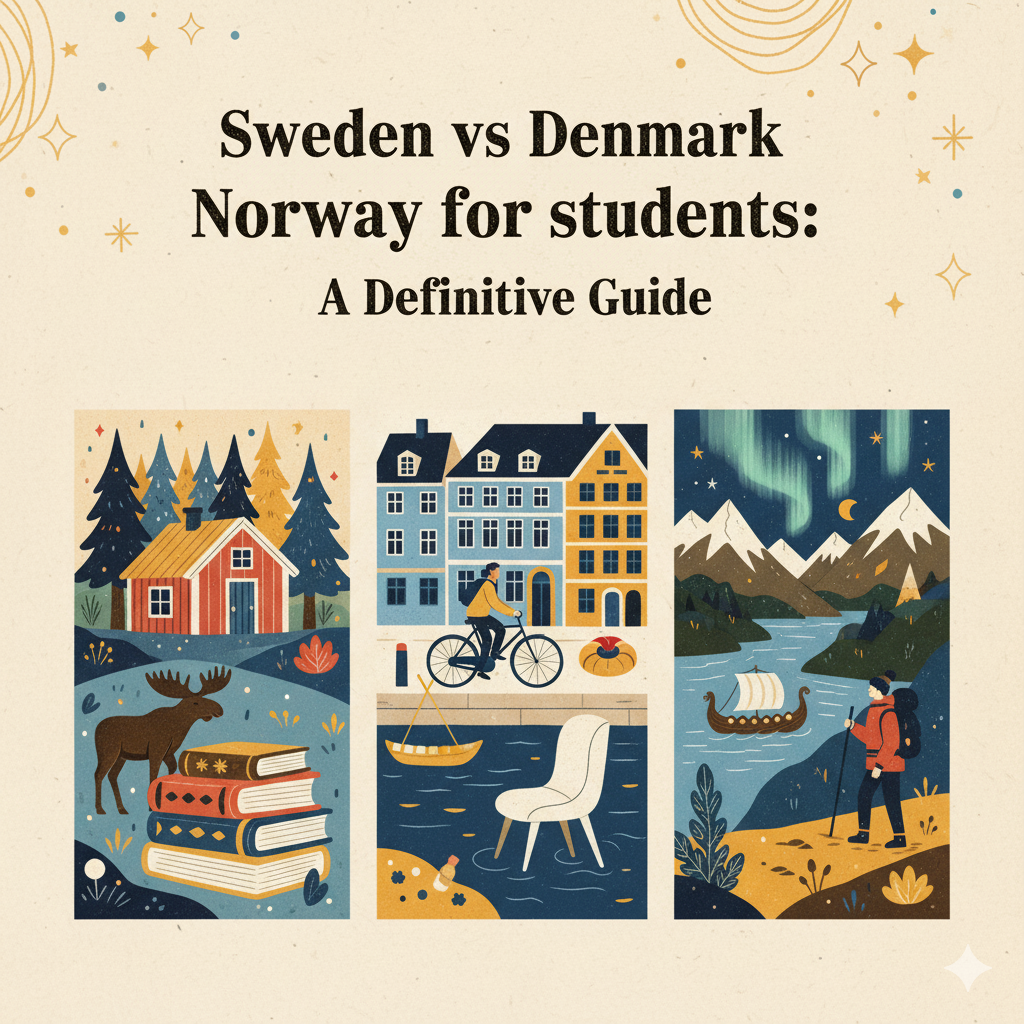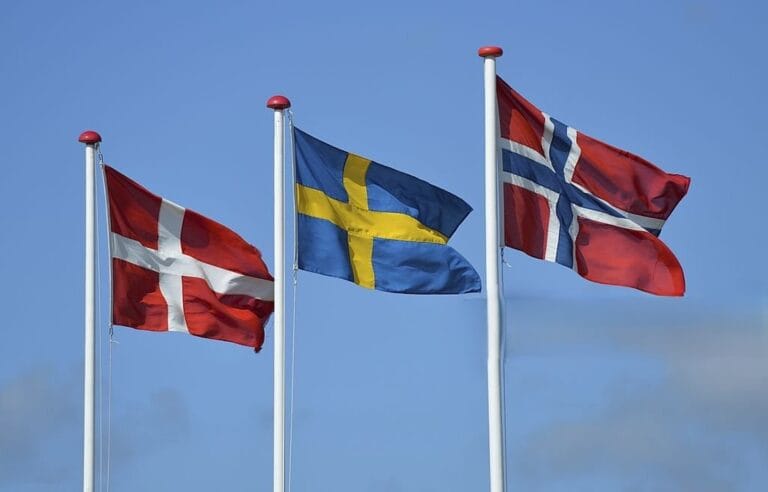Choosing the ideal location for your study abroad experience can be daunting; Given that there are so many appealing options available, it is, therefore, crucial to carefully evaluate your choices. Ultimately, taking the time to evaluate each location will lead to a more fulfilling experience.
Scandinavia, renowned for its high-quality education, innovative research, and breathtaking landscapes, consistently draws international students seeking a world-class academic journey. Choosing between Sweden, Denmark, and Norway can be challenging; however, if you are considering opportunities in IT or Engineering, this guide is here to help. Furthermore, it provides a thorough comparison that will assist you in making a confident decision..
We understand that this is a significant decision, and we’re here to help you find the perfect fit. This guide explains differences in cost of living, post-study work options, applications, and the balance of city life and nature. With this information, you can choose the Scandinavian country that best matches your academic, personal, and career goals. So, let’s explore the nuances of studying in Scandinavia.

Understanding the Scandinavian Appeal for Students
Before exploring the specific differences, it’s essential to understand what makes Scandinavia such an appealing destination for international students. These countries consistently rank highly in global education reports, largely due to their commitment to innovative teaching methods and a focus on practical skills that prepare students for the global workforce. Beyond academics, there’s a strong emphasis on sustainability and social responsibility. This is reflected in their progressive policies and environmentally conscious practices, resonating strongly with students who prioritize ethical and impactful careers.
Scandinavia’s commitment to technological advancement further solidifies its appeal, particularly for those in fields like IT and engineering. The region boasts cutting-edge research facilities and fosters a collaborative environment that encourages innovation and creativity. The region’s natural beauty offers recreational opportunities that support well-being and personal growth. From Norway’s fjords to Copenhagen’s streets, students can balance academics with outdoor experiences. Ultimately, Scandinavia offers not just an education but an opportunity to become a well-rounded and globally aware individual.
What is the Main Difference in the Cost of Living Between Norway, Sweden, and Denmark?
Understanding the cost of living is paramount when planning your study abroad journey. Norway is generally the most expensive among the three countries, primarily due to higher prices for everyday essentials such as food, accommodation, and transportation. Expect to allocate a higher budget for groceries, rent, and public transportation if you choose to study in Norway. Denmark follows Norway, with Copenhagen, its capital city, being a relatively expensive city. Rent, dining out, and entertainment can contribute to a higher monthly budget.
Sweden, on the other hand, tends to be the most affordable of the three, particularly if you venture beyond the major cities like Stockholm and Gothenburg. You may find lower rental costs and more budget-friendly options for food and transportation. It’s crucial to remember that while tuition fees are often free or subsidized for EU/EEA citizens, non-EU students might face tuition fees. These fees can vary significantly depending on the university and program. It’s therefore essential to research the specific tuition costs for your chosen program.
Beyond tuition, always factor in monthly expenses such as rent, food, transportation, study materials, and personal expenses. Creating a detailed budget will help you manage your finances effectively and ensure a smooth and enjoyable study abroad experience. Understanding the nuances of cost-of-living differences is a vital step in deciding if you prefer to study in Sweden or Norway.
Which Country Generally Has Better Post-Study Work Opportunities for Graduates?
Securing employment after graduation is a significant consideration for many international students. All three Scandinavian countries offer post-study work opportunities, but the specific requirements and job availability can vary. Sweden has been actively working to attract and retain international talent. There are government initiatives aimed at streamlining the visa application process for graduates, making it easier for them to transition from student to employee.
Denmark, renowned for its strong emphasis on innovation and entrepreneurship, provides an attractive environment for individuals seeking to establish their own businesses. The country supports startups with resources and programs that foster growth and success. Norway, with its robust oil and gas industry and a rapidly growing tech sector, offers unique opportunities in specific fields. Engineers, in particular, may find promising career paths in Norway’s energy and technology industries.
Regardless of your chosen country, networking, learning the local language, and tailoring your skills to meet the local job market’s needs are crucial for securing employment. Actively engaging with industry professionals, attending career fairs, and gaining relevant work experience through internships can significantly increase your chances of finding a job after graduation. Preparing early and proactively seeking opportunities will set you on the path to a successful career in Scandinavia.
How Do the University Application Processes Differ by Country?
The university application processes differ slightly across Sweden, Denmark, and Norway. All three countries generally require a completed application form, official transcripts of your previous academic records, proof of English language proficiency (such as IELTS or TOEFL scores), and a compelling statement of purpose. The statement of purpose is your chance to showcase your academic interests, motivations, and goals, so ensure you dedicate time and effort to crafting a well-written and persuasive statement.
Sweden utilizes a centralized application portal called University Admissions, which simplifies the application process by allowing you to apply to multiple programs at different universities through a single platform. Denmark typically requires direct application to the specific university you are interested in attending. This means you will need to visit each university’s website and follow their particular application instructions. Norway also requires direct application to the university, and specific programs, such as those in art and design, may have additional requirements, such as portfolio submissions.
It’s essential to start your research early as some programs have early application deadlines. Be aware of the specific deadlines for your chosen programs and ensure you submit all required documents on time. Thoroughly review the application requirements for each university and program to avoid any errors or omissions that could negatively impact your application. Planning and paying attention to detail will ensure a smooth and successful application process.
Which Country is Better for a Vibrant City Life Versus Experiencing Nature?
Each Scandinavian country offers a unique blend of urban and natural experiences, catering to different preferences and lifestyles. Denmark, particularly Copenhagen, is renowned for its vibrant city life. Copenhagen boasts a thriving cultural scene, world-class restaurants, and a cycling-friendly infrastructure. This makes it an ideal destination for those who enjoy urban exploration, cultural events, and culinary delights.
Sweden offers a well-balanced combination of urban amenities and natural beauty. Cities like Stockholm and Gothenburg offer a lively atmosphere with numerous cultural attractions, while also providing easy access to stunning archipelagos, lush forests, and serene lakes. This makes Sweden an ideal choice for those seeking a harmonious blend of city living and outdoor recreation.
Norway, on the other hand, is celebrated for its breathtaking natural beauty. The country’s majestic fjords, towering mountains, and shimmering glaciers offer unparalleled opportunities for outdoor adventures. While Oslo provides a metropolitan experience, Norway’s true appeal lies in its spectacular landscapes, making it a paradise for nature lovers.
Ultimately, your personal preference for city life versus experiencing nature will be a key factor in your decision. Consider your priorities and envision your ideal lifestyle to determine which country best aligns with your aspirations. Whether you crave the energy of a bustling city or the tranquility of the great outdoors, Scandinavia has something to offer everyone.
Best Scandinavian Country to Study for IT/Engineering
When it comes to pursuing studies in IT and Engineering, both Sweden and Norway stand out as strong contenders. Stockholm has established itself as a central tech hub in Europe, attracting a diverse range of startups and established companies. The city offers a dynamic ecosystem for innovation, providing numerous opportunities for students and graduates in the tech industry.
Norway, although it has a smaller tech sector compared to Sweden, offers robust opportunities in specific areas, particularly in the oil and gas industry, as well as in renewable energy technologies. Students interested in these fields may find unique and rewarding career paths in Norway. Denmark also has a developing tech sector and may be a viable option depending on your specific interests.
Ultimately, the best choice for you should align with your specialization, research interests, and career goals within IT or Engineering. Research the specific programs and research opportunities available at universities in each country to determine which one offers the best fit for your academic and professional aspirations. Carefully consider your priorities and make an informed decision based on your individual needs and goals.
Choosing a study abroad destination requires considering the cost of living, work opportunities, applications, lifestyle, and academic strengths. Evaluating these factors against your goals helps you make an informed decision and enjoy a transformative experience.
Are you feeling overwhelmed by the options and unsure which Scandinavian country aligns best with your unique profile and aspirations? Our experienced counselors can provide personalized guidance and support to help you navigate the complexities of studying abroad.
Contact us today for a consultation and let us help you find the perfect fit for your academic journey!
FAQs
1. Why should international students consider studying in Scandinavia?
Scandinavian countries — Sweden, Denmark, and Norway — offer world-class education, high living standards, and a strong focus on innovation, sustainability, and student well-being. Their universities consistently rank among the best globally and provide English-taught programs in diverse fields.
2. Which Scandinavian country is best for international students?
Each country has its strengths:
- Sweden – Ideal for innovation, research, and tech programs.
- Denmark – Great for design, architecture, and business courses.
- Norway – Popular for engineering and natural sciences, with many tuition-free universities.
The best choice depends on your academic interests, career goals, and budget.
3. Is studying in Scandinavia expensive for international students?
While living costs are higher than in many countries, the quality of life and education justify the expense. Norway offers tuition-free education at public universities, whereas Sweden and Denmark charge tuition fees for non-EU students but provide generous scholarships.
4. Are there scholarships available in Sweden, Denmark, and Norway?
Yes. All three countries offer multiple scholarships, such as:
- Sweden: Swedish Institute Scholarships, University-specific awards
- Denmark: Danish Government Scholarships
- Norway: Quota Scheme, Erasmus+, and university-specific funding
These can partially or fully cover tuition and living expenses.
5. What are the language requirements for studying in Scandinavia?
Most undergraduate and postgraduate programs are offered in English, and proficiency tests like IELTS or TOEFL are required. However, learning the local language (Swedish, Danish, or Norwegian) is beneficial for part-time jobs and daily communication.
6. Can international students work while studying in Scandinavia?
Yes.
- Sweden: Up to 20 hours/week during semesters.
- Denmark: 20 hours/week during semesters and full-time during vacations.
- Norway: 20 hours/week part-time work permit included with the student visa.
7. What are post-study work opportunities like in Scandinavia?
All three countries encourage graduates to stay and work:
- Sweden: 1-year post-study work visa extension
- Denmark: 3-year job search period after graduation
- Norway: 1-year residence permit to seek employment
8. How is student life in Scandinavian countries?
Student life is vibrant, safe, and inclusive. Universities emphasize collaboration, research, and sustainability. Students enjoy social benefits like healthcare, transport discounts, and access to scenic natural landscapes.
9. What are the visa requirements for studying in Sweden, Denmark, or Norway?
Students need a residence permit for studies. You must show proof of admission, financial stability, and health insurance. The process differs slightly across the three countries, but is generally smooth for genuine applicants.
10. How can IMFS help you apply to Scandinavian universities?
IMFS provides comprehensive support from selecting the right university, preparing for language proficiency tests, applying for scholarships, to offering visa guidance and pre-departure counseling, ensuring a smooth journey to your dream Scandinavian destination.


![Is an Ivy League Degree Worth It [2025 Guide to Salaries, ROI & Career Growth]](https://www.imfs.co.in/wp-content/uploads/2025/04/Is-an-Ivy-League-Degree-Worth-It-2025-Guide-to-Salaries-ROI-Career-Growth-300x169.jpg)


